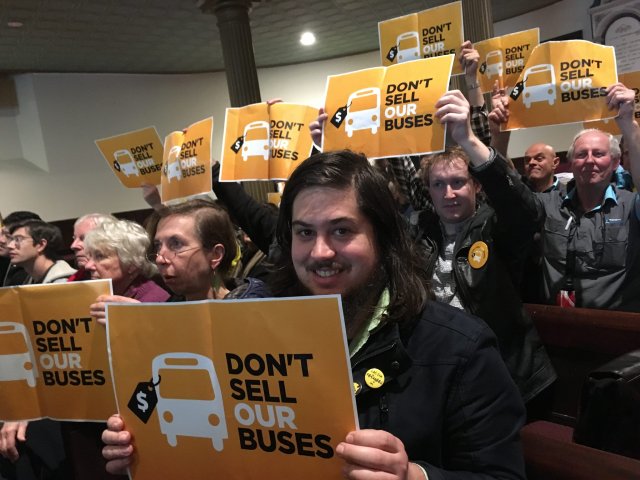
More than 200 people packed into the Pitt Street Uniting Church on June 28 to protest the state government’s plans to privatise public bus services in the city's inner west.
The community assembly, organised by UnionsNSW and the Sydney Alliance, drew bus drivers and other workers, unionists and concerned members of the public to join the growing campaign to stop the sell-off of public transport.
The proposed privatisation of buses in Sydney's inner west, or Region 6 of the metropolitan bus network, is a threat to the entire public transport system in the city. There are 233 routes in Region 6, with commuters taking more than 42 million trips on these routes every year.
About 1300 workers are based in the four depots to be privatised — Tempe, Kingsgrove, Burwood and Leichhardt. These depots are just the first to be placed in the government's privatisation firing line.
Transport minister Andrew Constance told the Australian Financial Review on March 20: “They will all be private. In 10 to 15 years’ time government will not be in the provision of public transport services.”
State secretary of the Rail Bus and Tram Employees Union (RBTU) Bus Division Chris Preston told the meeting: “This [Coalition] government has no mandate to privatise the buses. They went to the last election pledging that public transport would not be sold off.”
Associate Professor Kurt Iveson, from Sydney University, outlined the case to keep buses public. He refuted Constance’s claim that inner suburban public buses get more complaints than the private services on the outskirts of Sydney as “just not true”.
He exposed the other government claim that “privatisation reduces costs” by noting that international experience of privatisation shows that while costs may go down initially, in the end they go up again. Meanwhile, there are job cuts, reduced services, and increased fares.
Labor Opposition Leader Luke Foley said the move to sell off Region 6 of the bus network was announced “without warning” despite a commitment before the last state election by then-transport minister, now Premier, Gladys Berejiklian that the government had “no further plans” for privatisation of public transport,
“Public buses have been operating in Sydney now for 85 years. If the government gets away with this, the rest of the bus network will be sold off too. We can't let them succeed.”
UnionsNSW secretary Mark Morey said: “This government has privatised some $50 billion of our state assets. We have had enough. This is not just about the buses, but about our whole public sector. It's time to hold these politicians accountable. We can win this.”
Greens transport spokesperson Dr Mehreen Faruqi told the meeting: “We have to stop this privatisation madness. Public transport must work for the people, not the profiteers.
“The government is already gifting the new Metro railline to private operators. And the attack on rail and buses in Newcastle shows what we have to fight against, with all our strength.”
The speeches were followed by a roll call of representatives of unions and community organisations committed to supporting the struggle to stop the bus sell-off.
Finally, Thomas Costa from UnionsNSW explained some next steps in the campaign to save the public bus network. The first major public effort will be a community mobilisation on July 5 to gain more than 10,000 signatures on a mass petition against the sell-off.
Campaign supporters were urged to attend suburban bus stops to hand out leaflets and gather signatures from the public. More than 10,000 signatures will allow opposition parties to force the government to a parliamentary debate on the bus privatisation.
The June 28 community assembly follows a strike by bus drivers on May 18, a “free fare day” implemented by drivers on June 1, a June 15 public meeting in Marrickville, organised by Labor and one hosted by the Greens on June 20 in Leichhardt.
[To get involved and for more information visit www.dontsellourbuses.org.au.]
Like the article? Subscribe to Green Left now! You can also like us on Facebook and follow us on Twitter.